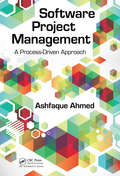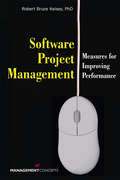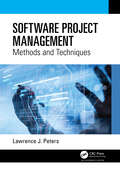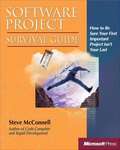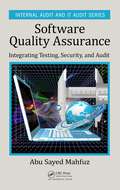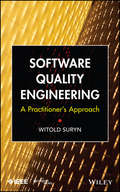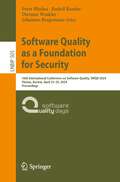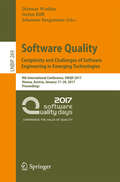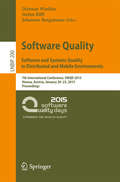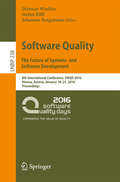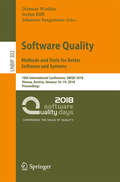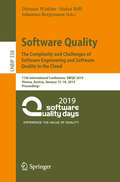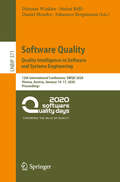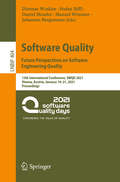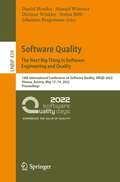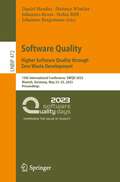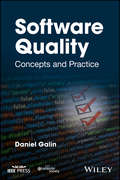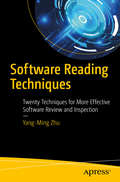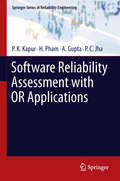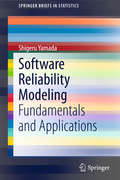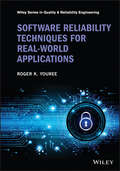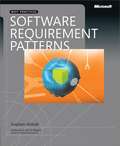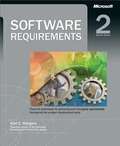- Table View
- List View
Software Project Management: A Process-Driven Approach
by Ashfaque AhmedTo build reliable, industry-applicable software products, large-scale software project groups must continuously improve software engineering processes to increase product quality, facilitate cost reductions, and adhere to tight schedules. Emphasizing the critical components of successful large-scale software projects, Software Project Management: A
Software Project Management: Measures for Improving Performance (Management Concepts)
by Robert Bruce KelseySoftware Project Management: Measures for Improving Performance focuses on more than the mechanics of project execution. By showing the reader how to identify and solve real world problems that put schedule, cost, and quality at risk, this guide gets to the heart of improving project control and performance.• Identify measurement needs and goals• Determine what measures to use to maximize the value of data• Interpret data and report the results• Diagnose quality and productivity issues• Use metrics data to solve real problemsThis is a must-read for project managers and engineering managers working in organizations where deadlines are tight, the workload is daunting, and daily crises are the rule rather than the exception. The text provides simple run rate data through progressively advanced measures, as well as:• Examples that show you how to combine measures to solve complex problems• Exercises that guide you through best practices for metric program development and implementationFrom beginning to end, Software Project Management: Measures for Improving Performance guides you to improved project performance — long before you turn the last page!
Software Project Management: Methods and Techniques
by Lawrence J. PetersThe management of a software project has been shown to be the number one factor in determining a software development project’s success. It has been found that most software projects fail because of poor management. Not surprisingly, most software development managers have not been trained in project management. Software Project Management: Methods and Techniques aims to remedy this situation in two ways: familiarizing software developers with the elements of the project management discipline and providing fact-based resources on practicing software project management.Much like the checklist pilots go through prior to a flight, this book provides a pre-project checklist which enables the software engineering team to review and evaluate an extensive set of technical and sociopolitical risks which will help the software project manager and the team determine the project team’s chances of success. This same list and the individual question responses can be used later as part of the project’s closeout process helping team members to improve their individual and collective abilities to assess risk.Intended for both students and software project managers, the book is organized along the lines of the five major functions of a software project manager: planning; scheduling and costing; controlling; staffing; and motivating. The basics of each of these functions are presented in a single chapter. These are followed by a series of narrow topic presentations in the form of appendices that are intended to help solve specific problems that may occur during the conduct of a software project. As in the main portion of the text, the appendices include references that provide an avenue into further detail on the topic. Designed to promote project success, this approach has been taken because software projects are each unique undertakings such that providing a "one size fits all" approach will fail most of the time.
Software Project Survival Guide
by Steve Mcconnell<div xmlns="http://www.w3.org/1999/xhtml"><p>This is the field guide for everyone involved in software development--especially those without formal management training. Acclaimed expert Steve McConnell maps out a proven approach to project management</p></div>
Software Quality Assurance: Integrating Testing, Security, and Audit (Security, Audit and Leadership Series)
by Abu Sayed MahfuzSoftware Quality Assurance: Integrating Testing, Security, and Audit focuses on the importance of software quality and security. It defines various types of testing, recognizes factors that propose value to software quality, and provides theoretical and real-world scenarios that offer value and contribute quality to projects and applications. The practical synopsis on common testing tools helps readers who are in testing jobs or those interested in pursuing careers as testers. It also helps test leaders, test managers, and others who are involved in planning, estimating, executing, and maintaining software. The book is divided into four sections: The first section addresses the basic concepts of software quality, validation and verification, and audits. It covers the major areas of software management, software life cycle, and life cycle processes. The second section is about testing. It discusses test plans and strategy and introduces a step-by-step test design process along with a sample test case. It also examines what a tester or test lead needs to do before and during test execution and how to report after completing the test execution. The third section deals with security breaches and defects that may occur. It discusses documentation and classification of incidences as well as how to handle an occurrence. The fourth and final section provides examples of security issues along with a security policy document and addresses the planning aspects of an information audit. This section also discusses the definition, measurement, and metrics of reliability based on standards and quality metrics methodology CMM models. It discusses the ISO 15504 standard, CMMs, PSP, and TSP and includes an appendix containing a software process improvement sample document.
Software Quality Engineering: A Practitioner's Approach
by Witold SurynA concise, engineering-oriented resource that provides practical support to IT professionals and those responsible for the quality of the software or systems they develop Software quality stems from two distinctive, but associated, topics in software engineering: software functional quality and software structural quality. <P><P>This book studies the tenets of both of these notions, which focus on the efficiency and value of a design, respectively. It addresses engineering quality on both the application and system levels with attention to information systems (IS) and embedded systems (ES) as well as recent developments. <P>Software Quality Engineering introduces the basic concepts of quality engineering like the nature of the engineering process, quality models and measurements, and evaluation quality, and provides a step-by-step overview of the application of software quality engineering in commonly recognized phases of the software development process. It also discusses management of software quality engineering processes, with special attention to budget, planning, conflict resolution, and traceability of quality requirements. Targeted at graduate engineering students and software quality specialists, Software Quality Engineering: Provides an analysis of interdependence between software functionality and its quality Includes a list of software quality engineering "to-dos" and models of software quality requirements traceability Covers the practical use of related ISO/IEC JTCI/SC7 standards
Software Quality as a Foundation for Security: 16th International Conference on Software Quality, SWQD 2024, Vienna, Austria, April 23–25, 2024, Proceedings (Lecture Notes in Business Information Processing #505)
by Dietmar Winkler Johannes Bergsmann Rudolf Ramler Peter BludauThis book constitutes the refereed proceedings of the 16th Software Quality Days Conference, SWQD 2024, held in Vienna, Austria, during April 23-25, 2024. The Software Quality Days (SWQD) conference started in 2009 and has grown to the biggest conference on software quality in Europe. The program of the SWQD conference is designed to encompass a stimulating mixture of practical presentations and new research topics in scientific presentations. The guiding conference topic of the SWQD 2024 is “Software Quality as a Foundation for Security”. The 7 full papers and 2 short papers presented in this volume were carefully reviewed and selected from 16 submissions. The papers were organized in topical sections as follows: Requirements engineering; software quality; continuous integration and deployment; communication and collaboration; artificial intelligence; and security and compliance.
Software Quality. Complexity and Challenges of Software Engineering in Emerging Technologies
by Dietmar Winkler Stefan Biffl Johannes BergsmannThis book constitutes the refereed proceedings of the 9th Software Quality Days Conference, SWQD 2017, held in Vienna, Austria, in January 2017. The SWQD conference offers a range of comprehensive and valuable information by presenting new ideas from the latest research papers, keynote speeches by renowned academics and industry leaders, professional lectures, exhibits, and tutorials. The 4 full papers and 7 short papers presented in this volume were carefully reviewed and selected from 21 submissions. They were organized in topical sections named: model-driven development and configuration management; software development and quality assurance; software quality assurance in industry; crowdsourcing in software engineering; software testing and traceability; and process improvement. The book also contains one keynote talk in full paper length.
Software Quality. Complexity and Challenges of Software Engineering in Emerging Technologies: 9th International Conference, SWQD 2017, Vienna, Austria, January 17-20, 2017, Proceedings (Lecture Notes in Business Information Processing #269)
by Dietmar Winkler, Stefan Biffl and Johannes BergsmannThis book constitutes the refereed proceedings of the 9th Software Quality Days Conference, SWQD 2017, held in Vienna, Austria, in January 2017. The SWQD conference offers a range of comprehensive and valuable information by presenting new ideas from the latest research papers, keynote speeches by renowned academics and industry leaders, professional lectures, exhibits, and tutorials. The 4 full papers and 7 short papers presented in this volume were carefully reviewed and selected from 21 submissions. They were organized in topical sections named: model-driven development and configuration management; software development and quality assurance; software quality assurance in industry; crowdsourcing in software engineering; software testing and traceability; and process improvement. The book also contains one keynote talk in full paper length.
Software Quality. Software and Systems Quality in Distributed and Mobile Environments
by Dietmar Winkler Stefan Biffl Johannes BergsmannThis book constitutes the refereed proceedings of the scientific track of the 7th Software Quality Days Conference, SWQD 2015, held in Vienna, Austria, in January 2015. The SWQD conference offers a range of comprehensive and valuable information by presenting new ideas from the latest research papers, keynote speeches by renowned academics and industry leaders, professional lectures, exhibits, and tutorials. The four scientific full papers accepted for SWQD were each peer reviewed by three or more reviewers and selected out of 13 high-quality submissions. Further, four short papers were also presented and are included in this book. The papers are organized into topical sections on risk management and inspection, change impact analysis and systems testing, and software and systems architectures.
Software Quality. The Future of Systems- and Software Development
by Dietmar Winkler Stefan Biffl Johannes BergsmannThis book constitutes the refereed proceedings of the scientific trackof the 8th Software Quality Days Conference, SWQD 2016, held in Vienna,Austria, in January 2016. The SWQD conference offers a range of comprehensive and valuableinformation by presenting new ideas from the latest research papers, keynotespeeches by renowned academics and industry leaders, professional lectures,exhibits, and tutorials. The fivescientific full papers accepted for SWQD were each peer reviewed by three ormore reviewers and selected out of 13 high-quality submissions. Further, nineshort papers were also presented and are included in this book. In addition,one keynote paper by Scott Ambler and Mark Lines is also included.
Software Quality: 10th International Conference, SWQD 2018, Vienna, Austria, January 16–19, 2018, Proceedings (Lecture Notes in Business Information Processing #302)
by Dietmar Winkler, Stefan Biffl and Johannes BergsmannThis book constitutes the refereed proceedings of the 10th Software Quality Days Conference, SWQD 2018, held in Vienna, Austria, in January 2018. The Software Quality Days (SWQD) conference started in 2009 and has grown to the biggest conferences on software quality in Europe with a strong community. The program of the SWQD conference is designed to encompass a stimulating mixture of practical presentations and new research topics in scientific presentations. The guiding conference topic of the SWQD 2018 is “Software Quality 4.0: Methods and Tools for better Software and Systems”, as novel technologies include new challenges and might require new and adapted methods and tools to support quality assurance activities early. The 6 full papers and 2 short papers presented in this volume were carefully reviewed and selected from 16 submissions. The volume also contains 2 invited talks. The contributions were organized in topical sections named: safety and security; requirements engineering and requirements-based testing; crowdsourcing in software engineering; software and systems architecture; experimentation in software engineering; and smart environments.
Software Quality: 11th International Conference, SWQD 2019, Vienna, Austria, January 15–18, 2019, Proceedings (Lecture Notes in Business Information Processing #338)
by Dietmar Winkler Stefan Biffl Johannes BergsmannThis book constitutes the refereed proceedings of the 11th Software Quality Days Conference, SWQD 2019, held in Vienna, Austria, in January 2019. The Software Quality Days (SWQD) conference started in 2009 and has grown to the biggest conference on software quality in Europe with a strong community. The program of the SWQD conference is designed to encompass a stimulating mixture of practical presentations and new research topics in scientific presentations. The guiding conference topic of the SWQD 2019 is “The Complexity and Challenges of Software Engineering and Software Quality in the Cloud”. The 5 full papers and 3 short papers presented in this volume were carefully reviewed and selected from 17 submissions. The volume also contains 2 invited talks. The contributions were organized in topical sections named: multi-disciplinary systems and software engineering; software quality and process improvement; software testing; knowledge engineering and machine learning; source code analysis; and software maintenance.
Software Quality: 12th International Conference, SWQD 2020, Vienna, Austria, January 14–17, 2020, Proceedings (Lecture Notes in Business Information Processing #371)
by Daniel Mendez Dietmar Winkler Stefan Biffl Johannes BergsmannThis book constitutes the refereed proceedings of the 12th Software Quality Days Conference, SWQD 2020, held in Vienna, Austria, in January 2020.The Software Quality Days (SWQD) conference started in 2009 and has grown to the biggest conference on software quality in Europe with a strong community. The program of the SWQD conference is designed to encompass a stimulating mixture of practical presentations and new research topics in scientific presentations. The guiding conference topic of the SWQD 2020 is “Quality Intelligence in Software and Systems Engineering”. The 5 full papers and 2 short papers presented in this volume were carefully reviewed and selected from 17 submissions. The volume also contains 2 invited talks. The contributions were organized in topical sections named: industry challenges and collaborations; software testing approaches; social aspects in software engineering; natural language processing; and software quality assurance concepts.
Software Quality: 13th International Conference, SWQD 2021, Vienna, Austria, January 19–21, 2021, Proceedings (Lecture Notes in Business Information Processing #404)
by Daniel Mendez Dietmar Winkler Stefan Biffl Johannes Bergsmann Manuel WimmerThis book constitutes the refereed proceedings of the 13th Software Quality Days Conference, SWQD 2021, which was planned to be held in Vienna, Austria, during January 19–21, 2021. Due to the COVID-19 pandemic, the conference was cancelled and will be merged with SWQD 2022. The Software Quality Days (SWQD) conference started in 2009 and has grown to the biggest conference on software quality in Europe with a strong community. The program of the SWQD conference is designed to encompass a stimulating mixture of practical presentations and new research topics in scientific presentations. The guiding conference topic of the SWQD 2021 is “Future Perspectives on Software Engineering Quality”. The 3 full papers and 5 short papers presented in this volume were carefully reviewed and selected from 13 submissions. The volume also contains 2 invited talks and one introductory paper for an interactive session. The contributions were organized in topical sections named: automation in software engineering; quality assurance for AI-based systems; machine learning applications; industry-academia collaboration; and experimentation in software engineering.
Software Quality: 14th International Conference on Software Quality, SWQD 2022, Vienna, Austria, May 17–19, 2022, Proceedings (Lecture Notes in Business Information Processing #439)
by Daniel Mendez Dietmar Winkler Stefan Biffl Johannes Bergsmann Manuel WimmerThis book constitutes the refereed proceedings of the 14th Software Quality Days Conference, SWQD 2022, held in Vienna, Austria, during May 17-19, 2022.The Software Quality Days (SWQD) conference started in 2009 and has grown to the biggest conference on software quality in Europe. The program of the SWQD conference is designed to encompass a stimulating mixture of practical presentations and new research topics in scientific presentations. The guiding conference topic of the SWQD 2022 is “What's The Next Big Thing in Software Engineering and Quality?”.The 4 full papers presented in this volume were carefully reviewed and selected from 8 submissions. The contributions were organized in two topical sections named: AI in Software Engineering; and Quality Assurance for Software-Intensive Systems. The book also contains two invited talks.
Software Quality: 15th International Conference, SWQD 2023, Munich, Germany, May 23-25, 2023, Proceedings (Lecture Notes in Business Information Processing #472)
by Daniel Mendez Dietmar Winkler Stefan Biffl Johannes Bergsmann Johannes KrossThis book constitutes the refereed proceedings of the 15th Software Quality Days Conference, SWQD 2023, held in Munich, Germany, during May 23-25, 2023. The Software Quality Days (SWQD) conference started in 2009 and has grown to the biggest conference on software quality in Europe. The program of the SWQD conference is designed to encompass a stimulating mixture of practical presentations and new research topics in scientific presentations. The guiding conference topic of the SWQD 2023 is “Higher Software Quality through Zero Waste Development”. The 4 full papers and 2 short papers presented in this volume were carefully reviewed and selected from 10 submissions. The volume also contains one invited talk.
Software Quality: Concepts and Practice
by Daniel GalinThe book presents a comprehensive discussion on software quality issues and software quality assurance (SQA) principles and practices, and lays special emphasis on implementing and managing SQA. Primarily designed to serve three audiences; universities and college students, vocational training participants, and software engineers and software development managers, the book may be applicable to all personnel engaged in a software projects Features: A broad view of SQA. The book delves into SQA issues, going beyond the classic boundaries of custom-made software development to also cover in-house software development, subcontractors, and readymade software. An up-to-date wide-range coverage of SQA and SQA related topics. Providing comprehensive coverage on multifarious SQA subjects, including topics, hardly explored till in SQA texts. A systematic presentation of the SQA function and its tasks: establishing the SQA processes, planning, coordinating, follow-up, review and evaluation of SQA processes. Focus on SQA implementation issues. Specialized chapter sections, examples, implementation tips, and topics for discussion. Pedagogical support: Each chapter includes a real-life mini case study, examples, a summary, selected bibliography, review questions and topics for discussion. The book is also supported by an Instructor’s Guide.
Software Reading Techniques
by Yang‐ming ZhuLearn twenty software reading techniques to enhance your effectiveness in reviewing and inspecting software artifacts such as requirements specifications, designs, code files, and usability. Software review and inspection is the best practice in software development that detects and fixes problems early. Software professionals are trained to write software but not read and analyze software written by peers. As a result, individual reading skills vary widely. Because the effectiveness of software review and inspection is highly dependent on individual reading skills, differential outcomes among software readers vary by a factor of ten. Software Reading Techniques is designed to close that gap. Dr Yang‐Ming Zhu's depth of experience as a software architect, team leader, and scientist make him singularly well-equipped to bring you up to speed on all the techniques and tips for optimizing the effectiveness and efficiency of your software review and inspection skills. What You'll Learn: Improve software review, inspection procedures, and reading skills Study traditional and modern advanced reading techniques applicable to software artifacts Master specific reading techniques for software requirements specification, software design, and code Who This Book Is For: Software professionals and software engineering students and researchers
Software Receiver Design: Build Your Own Digital Communications System in Five Easy Steps
by C. Richard Johnson William A. Sethares Andrew G. KleinHave you ever wanted to know how modern digital communications systems work? Find out with this step-by-step guide to building a complete digital radio that includes every element of a typical, real-world communication system. Chapter by chapter, you will create a MATLAB realization of the various pieces of the system, exploring the key ideas along the way, as well as analyzing and assessing the performance of each component. Then, in the final chapters, you will discover how all the parts fit together and interact as you build the complete receiver. In addition to coverage of crucial issues, such as timing, carrier recovery and equalization, the text contains over 400 practical exercises, providing invaluable preparation for industry, where wireless communications and software radio are becoming increasingly important. A variety of extra resources are also provided online, including lecture slides and a solutions manual for instructors.
Software Reliability Assessment with OR Applications
by Hoang Pham P. C. Jha P. K. Kapur A. GuptaSoftware Reliability Assessment with OR Applications is a comprehensive guide to software reliability measurement, prediction, and control. It provides a thorough understanding of the field and gives solutions to the decision-making problems that concern software developers, engineers, practitioners, scientists, and researchers. Using operations research techniques, readers will learn how to solve problems under constraints such as cost, budget and schedules to achieve the highest possible quality level. Software Reliability Assessment with OR Applications is a comprehensive text on software engineering and applied statistics, state-of-the art software reliability modeling, techniques and methods for reliability assessment, and related optimization problems. It addresses various topics, including: unification methodologies in software reliability assessment; application of neural networks to software reliability assessment;software reliability growth modeling using stochastic differential equations;software release time and resource allocation problems; andoptimum component selection and reliability analysis for fault tolerant systems.Software Reliability Assessment with OR Applications is designed to cater to the needs of software engineering practitioners, developers, security or risk managers, and statisticians. It can also be used as a textbook for advanced undergraduate or postgraduate courses in software reliability, industrial engineering, and operations research and management.
Software Reliability Modeling
by Shigeru YamadaSoftware reliability is one of the most important characteristics of software product quality. Its measurement and management technologies during the software product life cycle are essential to produce and maintain quality/reliable software systems. Part 1 of this book introduces several aspects of software reliability modeling and its applications. Hazard rate and nonhomogeneous Poisson process (NHPP) models are investigated particularly for quantitative software reliability assessment. Further, imperfect debugging and software availability models are discussed with reference to incorporating practical factors of dynamic software behavior. Three software management problems are presented as application technologies of software reliability models: the optimal software release problem, the statistical testing-progress control, and the optimal testing-effort allocation problem. Part 2 of the book describes several recent developments in software reliability modeling and their applications as quantitative techniques for software quality/reliability measurement and assessment. The discussion includes a quality engineering analysis of human factors affecting software reliability during the design review phase, which is the upper stream of software development, as well as software reliability growth models based on stochastic differential equations and discrete calculus during the testing phase, which is the lower stream. The final part of the book provides an illustration of quality-oriented software management analysis by applying the multivariate analysis method and the existing software reliability growth models to actual process monitoring data.
Software Reliability Techniques for Real-World Applications (Quality and Reliability Engineering Series)
by Roger K. YoureeSOFTWARE RELIABILITY TECHNIQUES FOR REAL-WORLD APPLICATIONS SOFTWARE RELIABILITY TECHNIQUES FOR REAL-WORLD APPLICATIONS Authoritative resource providing step-by-step guidance for producing reliable software to be tailored for specific projects Software Reliability Techniques for Real-World Applications is a practical, up to date, go-to source that can be referenced repeatedly to efficiently prevent software defects, find and correct defects if they occur, and create a higher level of confidence in software products. From content development to software support and maintenance, the author creates a depiction of each phase in a project such as design and coding, operation and maintenance, management, product production, and concept development and describes the activities and products needed for each. Software Reliability Techniques for Real-World Applications introduces clear ways to understand each process of software reliability and explains how it can be managed effectively and reliably. The book is supported by a plethora of detailed examples and systematic approaches, covering analogies between hardware and software reliability to ensure a clear understanding. Overall, this book helps readers create a higher level of confidence in software products. In Software Reliability Techniques for Real-World Applications, readers will find specific information on: Defects, including where defects enter the project system, effects, detection, and causes of defects, and how to handle defects Project phases, including concept development and planning, requirements and interfaces, design and coding, and integration, verification, and validation Roadmap and practical guidelines, including at the start of a project, as a member of an organization, and how to handle troubled projects Techniques, including an introduction to techniques in general, plus techniques by organization (systems engineering, software, and reliability engineering) Software Reliability Techniques for Real-World Applications is a practical text on software reliability, providing over sixty-five different techniques and step-by-step guidance for producing reliable software. It is an essential and complete resource on the subject for software developers, software maintainers, and producers of software.
Software Requirement Patterns
by Stephen WithallLearn proven, real-world techniques for specifying software requirements with this practical reference. It details 30 requirement "patterns" offering realistic examples for situation-specific guidance for building effective software requirements. Each pattern explains what a requirement needs to convey, offers potential questions to ask, points out potential pitfalls, suggests extra requirements, and other advice. This book also provides guidance on how to write other kinds of information that belong in a requirements specification, such as assumptions, a glossary, and document history and references, and how to structure a requirements specification. A disturbing proportion of computer systems are judged to be inadequate; many are not even delivered; more are late or over budget. Studies consistently show one of the single biggest causes is poorly defined requirements: not properly defining what a system is for and what it's supposed to do. Even a modest contribution to improving requirements offers the prospect of saving businesses part of a large sum of wasted investment. This guide emphasizes this important requirement need--determining what a software system needs to do before spending time on development. Expertly written, this book details solutions that have worked in the past, with guidance for modifying patterns to fit individual needs--giving developers the valuable advice they need for building effective software requirements
Software Requirements
by Karl E. WiegersWithout formal, verifiable software requirements--and an effective system for managing them--the programs that developers think they've agreed to build often will not be the same products their customers are expecting. In SOFTWARE REQUIREMENTS, Second Edition, requirements engineering authority Karl Wiegers amplifies the best practices presented in his original award-winning text?now a mainstay for anyone participating in the software development process. In this book, you'll discover effective techniques for managing the requirements engineering process all the way through the development cycle--including dozens of techniques to facilitate that all-important communication between users, developers, and management. This updated edition features new case examples, anecdotes culled from the author's extensive consulting career, and specific Next Steps for putting the book's process-improvement principles into practice. You'll also find several new chapters, sample documents, and an incisive troubleshooting guide. Discover how to: Set achievable expectations for functionality and quality NEW: Incorporate business rules into application development Employ use cases to discover user requirements Arrest creeping requirements and manage change requests NEW: Deal with requirements on maintenance, outsourced, and package solution projects Curb the impulse to "gold-plate" your programs NEW: Grow effective requirements analysts Cut revisions--and costs--dramatically Produce better software! No matter what kind of software you build, or what your role in the development process, SOFTWARE REQUIREMENTS, Second Edition, delivers expert guidance and field-tested techniques for engineering software success.
